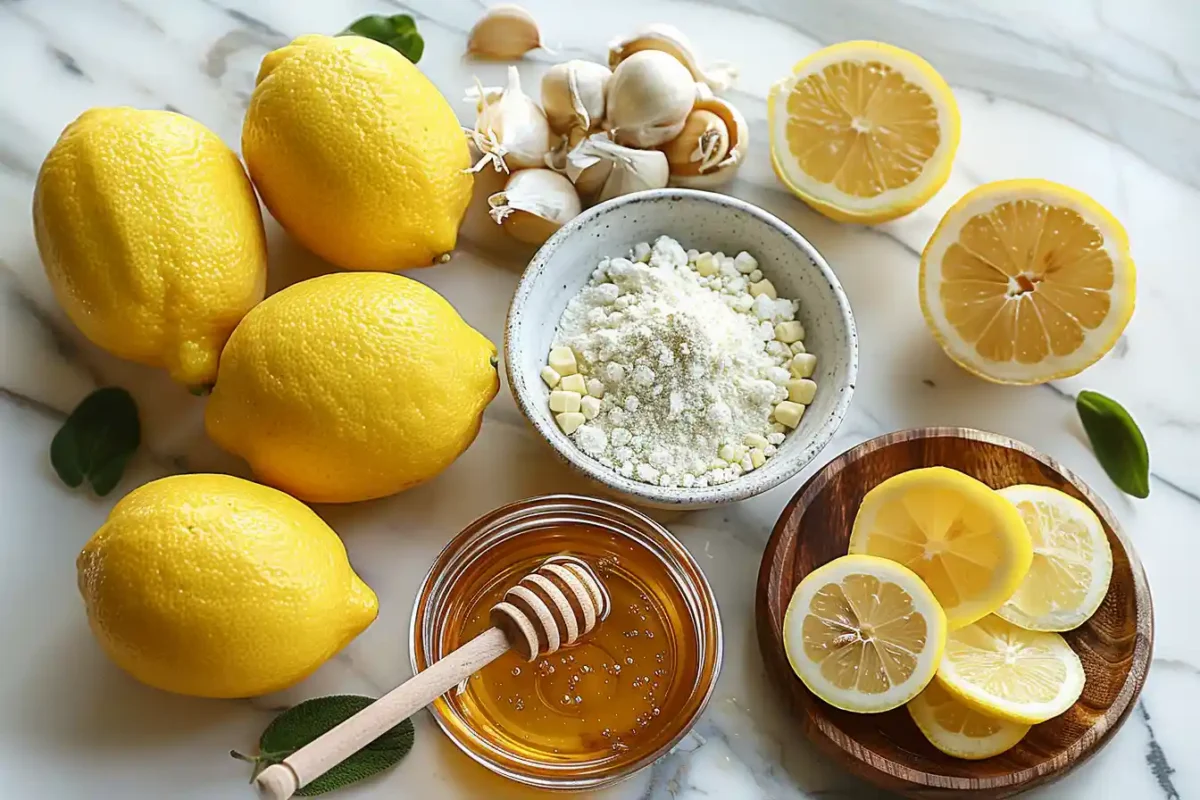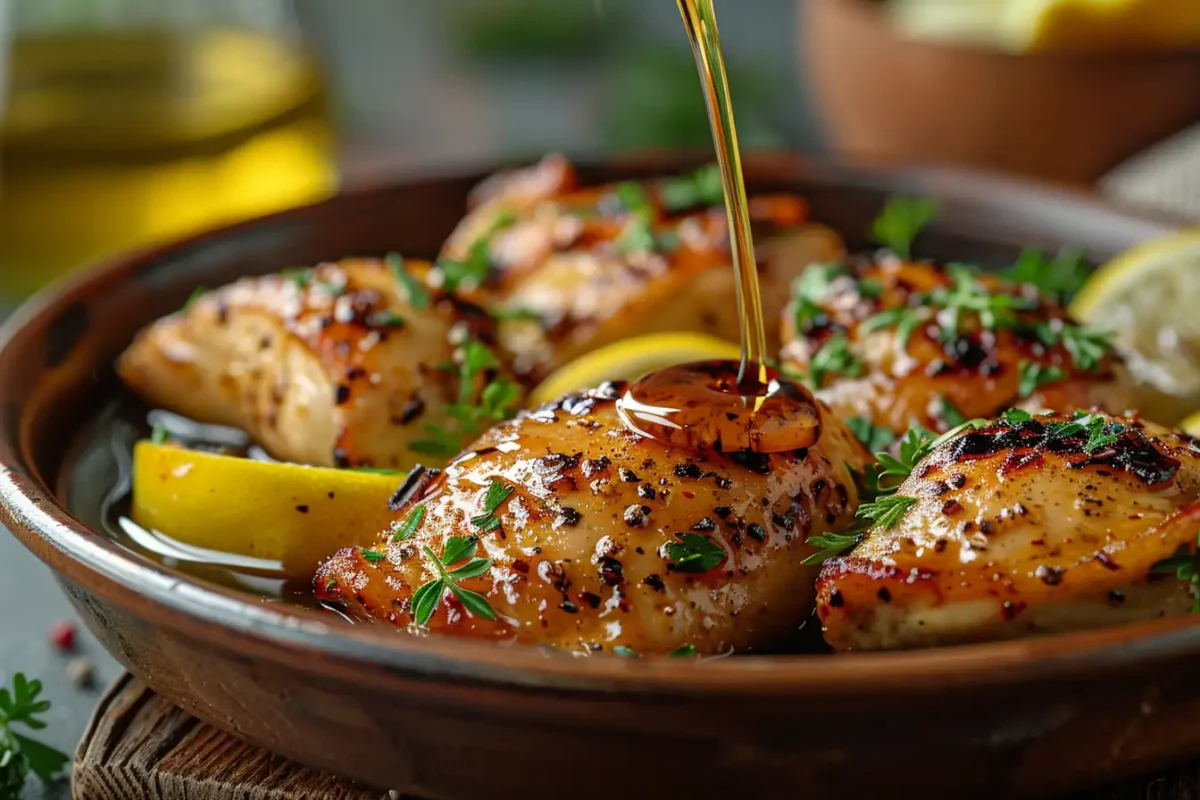Lemon chicken sauce is more than just a simple condiment—it’s a flavor-packed creation that brings together tangy, sweet, and savory elements in perfect harmony. Whether drizzled over crispy chicken or paired with fresh vegetables, this zesty favorite has a way of making any dish shine. But have you ever paused to ask, “What exactly goes into making this delightful sauce?”
Let’s peel back the layers of this culinary classic and uncover the secrets behind its irresistible charm. A staple in both Western and Asian kitchens, this versatile citrus-infused blend brightens up every dish it touches without overpowering the other flavors.
Often described by food lovers as “the sauce that gets it all right,” it’s tangy yet sweet, light yet satisfying—a true all-rounder. And the best part? Making it at home is easier than you’d think. So, grab your lemons, and let’s dive into this vibrant culinary journey.
Jump to:
Key Ingredients in Lemon Chicken Sauce
- Lemon Juice
- Freshly squeezed lemon juice is essential for a bright, tangy flavor.
- Avoid bottled lemon juice as it lacks the vibrant taste of fresh lemons.
- Sweeteners
- Sugar or honey balances the tartness of the lemon juice.
- Sugar provides a clean sweetness, while honey adds depth with earthy undertones.
- Thickening Agents
- Cornstarch or flour helps achieve the perfect, glossy consistency.
- These ingredients ensure the sauce clings evenly to the chicken or other dishes.
- Chicken Broth
- Adds depth and richness to the sauce.
- Enhances the savory flavor profile.
- Garlic
- Minced garlic provides a subtle, aromatic kick.
- Complements the tangy and sweet flavors of the sauce.
- Salt and Pepper
- Essential for seasoning and enhancing the overall taste.
- Adjust to personal preference for a balanced flavor.

Freshly squeezed lemon juice is essential for a bright, tangy flavor. Avoid bottled lemon juice as it lacks the vibrant taste of fresh lemons. For more tips on using lemon in chicken dishes, check out our guide on Lemon Marinade for Chicken.
Common Variations of Lemon Chicken Sauce
Lemon chicken sauce isn’t a one-size-fits-all recipe. Cooks around the world tweak it to fit their culinary traditions. Let’s explore some of the most popular variations.
Asian-Inspired Lemon Chicken Sauce
In Asian cuisine, lemon chicken sauce often includes soy sauce and ginger for a savory umami kick. Sometimes, a splash of rice vinegar joins the mix, creating a sauce that’s perfect for pairing with crispy fried chicken.
Mediterranean Lemon Chicken Sauce
Mediterranean versions incorporate olive oil and garlic, resulting in a richer, more robust sauce. Think of it as a citrusy glaze that’s perfect for grilled or baked chicken.
Creamy Lemon Chicken Sauce Variants
Craving something indulgent? Creamy versions add heavy cream or Greek yogurt for a luscious twist. These variations are great for pasta dishes or when you want a richer texture to accompany your chicken.
“Whether it’s zesty or creamy, lemon chicken sauce is like a chameleon—adapting beautifully to whatever dish it complements.”
How to Make Classic Lemon Chicken Sauce
If you’ve ever thought making lemon chicken sauce at home was too complicated, think again! With just a handful of pantry staples and a few minutes, you’ll have a sauce that rivals restaurant quality.
Step-by-Step Instructions for Beginners
Here’s a simple recipe to get you started:
Ingredients:
- ½ cup fresh lemon juice
- 2 tablespoons sugar (or honey)
- 1 tablespoon cornstarch
- 1 cup chicken broth
- 1 teaspoon garlic (minced)
- Salt and pepper to taste
Instructions:
- In a saucepan, combine chicken broth, lemon juice, and sugar.
- Bring the mixture to a gentle boil, stirring to dissolve the sugar.
- In a separate bowl, whisk cornstarch with water to create a slurry. Slowly add this to the simmering sauce while stirring.
- Add garlic, salt, and pepper. Continue to cook until the sauce thickens.
- Remove from heat, and voilà—your lemon chicken sauce is ready!
Tips for Perfect Flavor Balance
- Too Tangy? Add a bit more sugar or a drizzle of honey.
- Too Sweet? Dial it back with an extra squeeze of lemon juice.
- Too Thick? Thin it out with a splash of water or chicken broth.

Nutritional Insights of Lemon Chicken Sauce
Beyond its flavor, lemon chicken sauce offers some surprising health perks. Let’s take a closer look at what makes this sauce not just delicious, but nutritious too.
Calorie Breakdown and Macronutrients
Most lemon chicken sauces are relatively low in calories, averaging around 50-100 calories per serving (depending on the ingredients). Key macronutrients include:
- Carbohydrates: From sweeteners like sugar or honey.
- Proteins: If made with chicken broth.
- Fats: Minimal, unless you opt for creamy variations.
Health Benefits of Key Ingredients
- Lemons: High in vitamin C and antioxidants, supporting immune health.
- Honey: Offers antibacterial properties and a natural energy boost.
- Garlic: Known for its anti-inflammatory and heart-healthy benefits.
Most Common Problems When Making Lemon Sauce
Even the most seasoned cooks can face hiccups when crafting lemon chicken sauce. From texture issues to flavor imbalances, these challenges are all too common—but don’t worry, they’re easy to fix with a little know-how. Let’s tackle the most frequent problems and their solutions to ensure your sauce turns out flawless every time. 🌟
Sauce Too Runny? How to Fix It
A watery lemon chicken sauce can be a letdown. If it’s not thick enough to cling to your chicken, here’s how to fix it:
- Solution 1: Mix a slurry using 1 tablespoon of cornstarch or flour with 2 tablespoons of cold water. Gradually add it to the sauce while stirring over low heat. Watch as it thickens like magic!
- Solution 2: Simmer the sauce longer to let excess liquid evaporate. This method intensifies the flavors as well.
Pro Tip: Avoid adding cornstarch directly to the sauce without mixing it in water first—it can clump, and no one wants lumpy sauce!
Overpowering Lemon Taste: Adjusting Flavors
Sometimes, the tanginess of lemon juice can take center stage, overshadowing other flavors. But don’t fret—it’s an easy fix:
- Balance with Sweetness: Add a teaspoon of sugar, honey, or maple syrup to counteract the sharpness.
- Dilute with Broth: Stir in a little more chicken broth to mellow out the citrus punch.
- Add Fat: A small pat of butter or a splash of cream can tone down the acidity while adding richness.
Avoiding a Grainy Texture
A smooth, glossy sauce is what we aim for, but graininess can sneak in due to improperly mixed ingredients. To avoid this:
- Dissolve Ingredients Fully: Ensure sugar or cornstarch is completely dissolved before simmering.
- Strain the Sauce: Use a fine-mesh sieve to remove any lumps for a silky finish.
- Mind Your Heat: Cook over medium-low heat. High heat can cause the sauce to break or scorch, creating an unpleasant texture.
“Good sauce is like good conversation—smooth, balanced, and full of flavor.”
Pairing Citrus-Based Sauces with Meals
This tangy, versatile sauce shines brightest when paired with the right dishes, bringing balance and bold flavors to any meal. Whether you’re enhancing proteins, veggies, or grains, here’s how to make the most of its culinary magic. 🍴
Ideal Proteins for This Zesty Sauce
While chicken is a natural fit, this citrusy blend plays well with a variety of proteins:
- Seafood: Add a gourmet touch by drizzling it over salmon, shrimp, or scallops.
- Pork: Brush it onto pork chops or tenderloin for a glaze that’s bursting with flavor.
- Tofu: Perfect for vegetarians, it pairs beautifully with crispy tofu or tempeh, adding a tangy twist.
Side Dishes to Complement the Sauce
A good side dish can elevate your meal from good to unforgettable. Pair this sauce with:
- Rice: Steamed jasmine or brown rice absorbs the sauce beautifully.
- Roasted Vegetables: Think asparagus, Brussels sprouts, or carrots for a wholesome touch.
- Mashed Potatoes: Creamy potatoes provide a satisfying contrast to the zesty sauce.
Storing and Reheating Lemon Chicken Sauce
Sometimes, the sauce is so good you want to save it for later. But how do you store it without losing its signature flavor and texture? Let’s find out.
Best Practices for Refrigeration
Lemon chicken sauce can be refrigerated for up to 4 days if stored properly.
- Cool Completely: Allow the sauce to cool to room temperature before transferring it to an airtight container.
- Label and Date: Always mark the container with the date, so you know how fresh it is.
When reheating, use low heat and stir frequently to maintain its consistency. Adding a splash of water or broth can help if the sauce has thickened too much.
Can You Freeze Lemon Chicken Sauce?
Yes, you can freeze lemon chicken sauce! This is particularly helpful if you’ve made a large batch. Here’s how to do it:
- Let the sauce cool completely.
- Pour it into freezer-safe containers or zip-lock bags, leaving a little room for expansion.
- Label and freeze for up to 3 months.
When you’re ready to use it, thaw in the refrigerator overnight and reheat gently on the stove.

“Freezing is like hitting the pause button on your favorite sauce—it saves all the goodness for later!”
FAQs
What ingredients are used to make lemon chicken sauce?
At its core, lemon chicken sauce is made with fresh lemon juice, a sweetener like sugar or honey, chicken broth, and a thickening agent such as cornstarch. Additional ingredients like garlic, soy sauce, or even cream can be added to tweak the flavor profile and suit various preferences.
Why does my lemon chicken sauce taste overly sour, and how can I fix it?
If your sauce tastes too tangy, it’s likely due to an excess of lemon juice. To fix this, balance the flavors by adding a bit of sugar or honey. Want a creamier fix? A small pat of butter or a splash of cream can mellow out the acidity while adding richness.
What’s the best way to thicken lemon chicken sauce?
Thickening this sauce is simple: mix a slurry by combining cornstarch and water. Slowly whisk the slurry into your simmering sauce and stir until it reaches the perfect consistency.
Can I store and freeze lemon chicken sauce for later use?
Absolutely! Lemon chicken sauce freezes beautifully for up to three months. Just pour it into an airtight container or freezer bag. When ready to use, thaw it in the refrigerator overnight and gently reheat on the stove for fresh, zesty flavor.
Is lemon chicken sauce a healthy choice?
Yes, lemon chicken sauce can be a nutritious addition to your meals, especially if you use fresh, wholesome ingredients. Lemons are packed with vitamin C, and swapping refined sugar for honey or natural sweeteners can make it even healthier without compromising on taste.
“Lemon chicken sauce isn’t just for chicken—it’s your kitchen’s secret weapon for adding a burst of flavor to almost anything!”
Conclusion:
Lemon chicken sauce is a culinary gem that brings together tangy, sweet, and savory flavors in perfect harmony. From its simple yet impactful ingredients—like fresh lemon juice, sweeteners, and thickening agents—to its versatility in pairing with proteins, vegetables, and grains, this sauce is a must-have in any kitchen. Whether you’re a beginner or a seasoned cook, mastering this sauce opens the door to endless creative possibilities in your meals.
Final Thoughts:
What makes lemon chicken sauce truly special is its ability to transform ordinary dishes into extraordinary ones. Its balance of flavors, ease of preparation, and adaptability across cuisines make it a timeless favorite. Whether you’re drizzling it over crispy chicken, using it as a marinade, or experimenting with it in new ways, this sauce is a testament to the magic of simple, well-crafted recipes.
Call to Action:
Have you tried making lemon chicken sauce at home? What’s your favorite way to use it? Share your experiences or tips in the comments below! And if you haven’t tried it yet, what’s stopping you? Would you give this zesty sauce a go? Tell us below!

